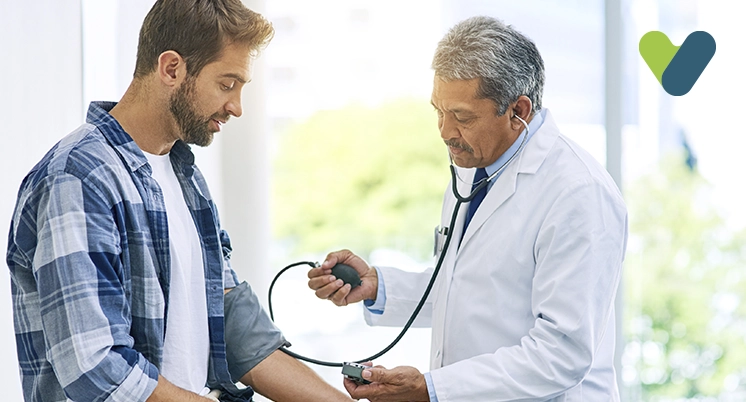For more than two decades, Nitu struggled with high blood pressure. Finally, the doctor performed a new-patient health check as part of the registration procedure and discovered that her blood pressure was 200/100, dangerously high. Raju was a 25-year-old student at the time, and he could see something wasn't quite right. After a big drinking night out, he'd burst blood vessels down his forearms, and a prior doctor informed him that he had the arteries of a 40-year-old smoker, even though he'd never smoked. So, they both researched it and tried implementing it in daily life.
What is Hypertension?
Most persons with high hypertension will need to be treated for the rest of their lives to avoid or postpone significant health complications caused by the disease. Adults' treatment typically focuses on lowering and maintaining hypertension below 130/80 millimetres of mercury (mmHg). Treatment options for hypertension include eating a healthy, low-salt diet, pulmonary hypertension treatment, and further lifestyle modifications.A Healthy Diet Can Help You Manage Hypertension
A balanced diet, which includes minimizing salt consumption, is an essential treatment of hypertension strategy. Consuming fewer than 2,300 milligrams (mg) of salt per day is recommended by the 2015-2020 Dietary Guidelines for Americans. High blood pressure patients may need to limit their salt consumption even further. According to the American Heart Association (AHA), adults with hypertension should take no more than 1,500 mg per day. It's critical to read food labels and pick low-sodium and "no salt added" alternatives at the supermarket and in the kitchen.The DASH diet, which emphasizes fruits, vegetables, and whole grains, and fat-free or low-fat milk products, fish, chicken, beans, nuts, and vegetable oils, may be recommended by your doctor. However, foods rich in saturated fats, such as fatty meats, full-fat dairy products, especially tropical oils like coconut and palm oils, and sugary beverages and other sweets, are restricted under the DASH diet.
A study of more than 400 persons with stage 1 high blood pressure issued in November 2017 in the Journal of the American of Cardiology indicated that combining a reduced diet with the DASH eating plan was just as effective as some medicines in decreasing systolic blood pressure.
Changes in Lifestyle to Lower and Manage Hypertension
Additional lifestyle adjustments may also aid in reducing and controlling blood pressure. These are some of them:- Maintaining a Healthy Body Weight Maintaining a healthy weight may aid in managing high blood pressure and prevent additional problems.
- Furthermore, losing 3 to 5% of your body weight may help reduce your risk of high blood pressure-related health issues.
- While a BMI of less than 25 for blood pressure management, your doctor may assist you in determining your precise weight objectives.
- Regular exercise may help you maintain a healthy weight and decrease your blood pressure.
- The American Heart Association advises 40 minutes of moderate-to-vigorous level aerobic exercise three or four times each week to reduce blood pressure.
- Keeping Alcohol Consumption to a Minimum Even if you don't have hypertension, drinking may increase your blood pressure; thus, everyone should limit their alcohol consumption.
- Healthy women of all ages and men over 65 should limit their alcohol consumption to one drink per day, while males 65 and younger should limit their consumption to two drinks per day.
- Smoking also raises blood pressure for a short time.
- Ask your doctor for advice on quitting smoking, and look into smoking cessation medications and gadgets to help you kick the habit.
- Stress Management Although the link between stress and high blood pressure is; still, stress contributes to hypertension risk factors such as poor nutrition and excessive alcohol use.
- In preparation for the fight-or-flight reaction, the stress chemicals adrenaline and cortisol cause the heart to beat quicker and blood vessels to constrict. As a result, it momentarily boosts blood pressure, but experts are currently looking into how persistent stress affects blood pressure over the term.
- You may enhance your mental and physical health by learning how to handle stress, relax, and deal with challenges.
- Yoga, deep breathing, and meditation are examples of relaxation exercises that help you relax and temporarily lower your blood pressure.
- Getting enough rest (aim for seven to nine hours per night)
- Exercising
- Listening to music or concentrating on something soothing and relaxing
Medication
When diet and lifestyle modifications are insufficient to control high blood pressure, they may require medication. Antihypertensives are a class of blood pressure medications that may be obtained with a prescription.- Beta-Blockers These medications decrease blood pressure by lowering heart rate and effort.
- Inhibitors of ACE Angiotensin-converting enzyme inhibitors, often known as ACE inhibitors, help the body generate less of the chemical angiotensin, promoting artery narrowing. In addition, these medications relax and open the blood arteries, lowering blood pressure.
- Blockers of Calcium Channels Block calcium from entering the heart and artery muscle cells. It also aids in the relaxation and opening of blood vessels, decreasing blood pressure.
- Blockers of Alpha, The resistance of the arteries and the muscular tone of the arterial walls, are relaxed.
- To treat hypertension, may use several of these medications in combination. Your doctor will collaborate with you to develop the optimal treatment plan for you.
- Hypertension medications at modest dosages are more beneficial for many individuals than taking more significant doses of single medicine to manage high blood pressure.
- Your doctor may need to experiment with several medicine combinations to see which one works best for you. It's important to carefully follow instructions and notify your healthcare practitioner of adverse effects.


